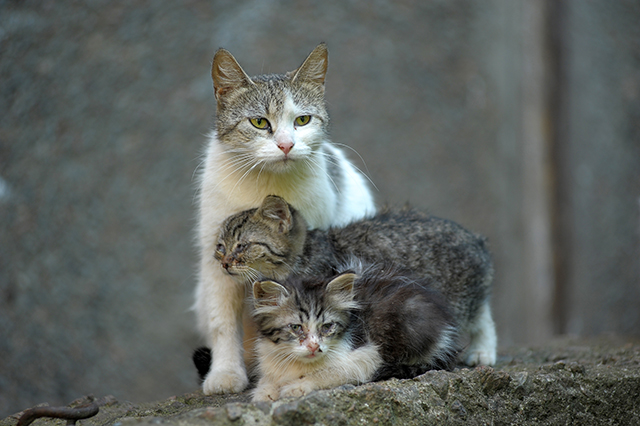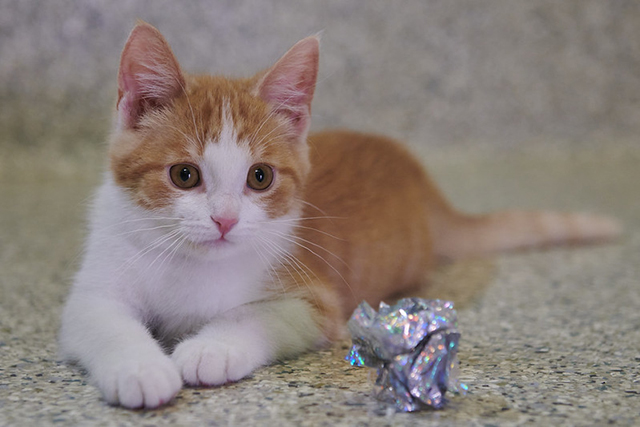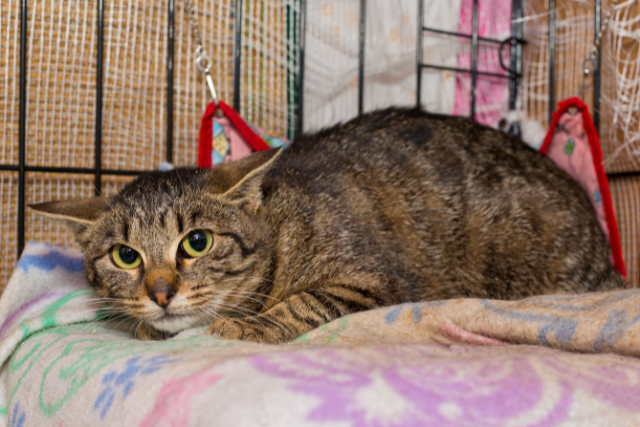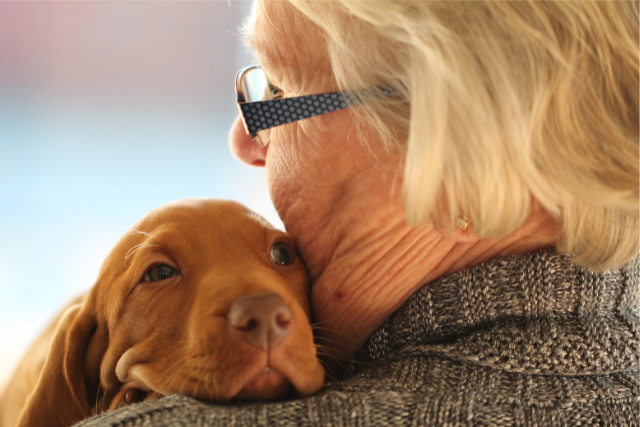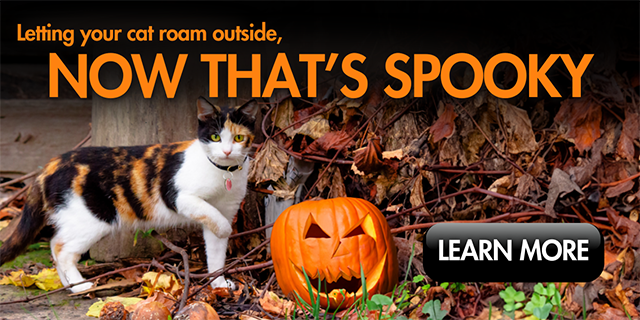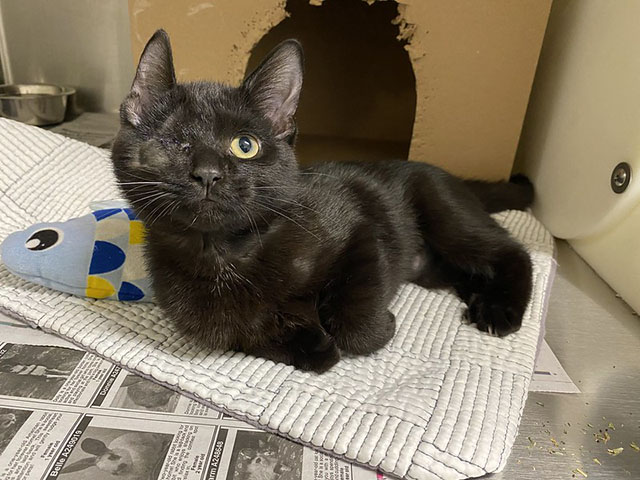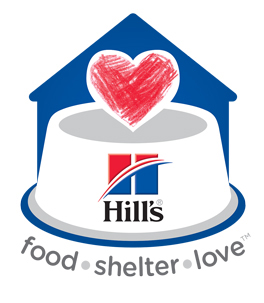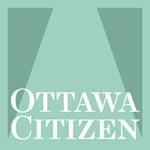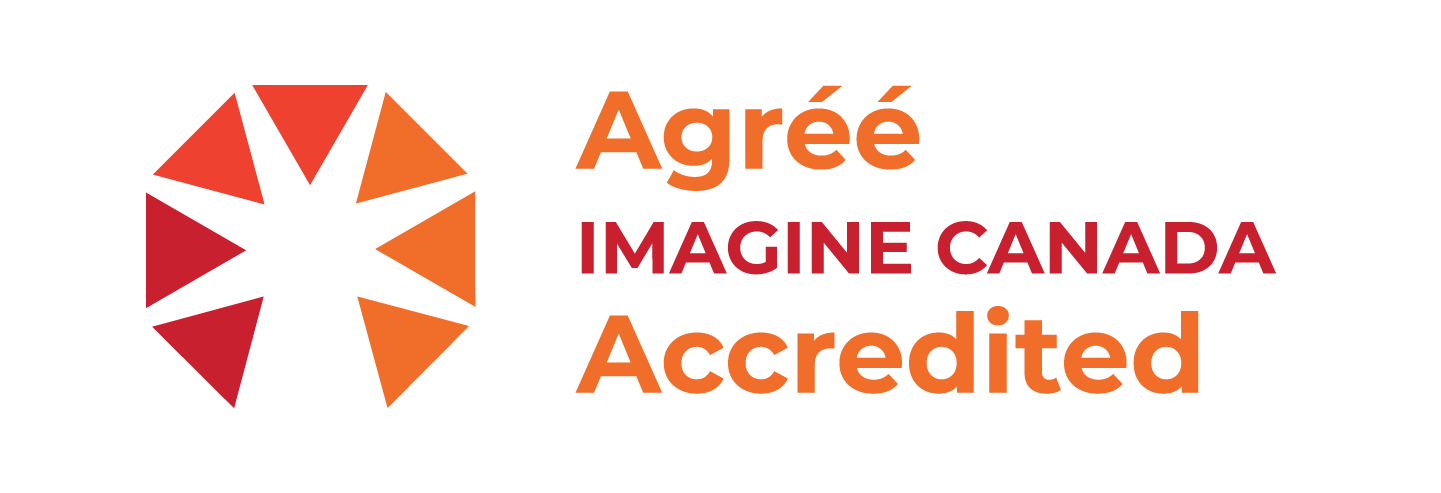|
Advocating for the animals... read more |
|||
| If you do not see the full page with images, please click here. | |||
|
Stepping Up for Ottawa's Cats |
|||
|
Recently, the OHS admitted a surge of cats. The cats came from a number of sources. Some were stray, others were surrendered by their families who could no longer care for them, and others were mothers with litters of kittens. National Feral Cat Day was also observed this month, and there are parallels in how Ottawa may better protect its domestic and feral cats. It's important to know that true feral cats are distinct from semi-socialized cats who roam outdoors. A feral cat has had limited or no contact with, and is fearful of people. They are typically born outdoors.A feral cat would be extremely fearful in captivity or living in a house with humans, so much that it would be cruel to do so, but there can be success socializing feral kittens, with the right intervention and resources. This hurdle is what led to the solution of trap, neuter and release — capturing feral cats to be neutered and returned to their colony. Last year, the OHS hosted Ottawa's Community Cat Summit to explore the best options for ending Ottawa's cycle of homeless cats. A major challenge that surfaced was the difficulty in locating feral cat colonies and gathering reliable information on how many roaming and feral cats are in the community. Another issue is the sheer number of feral cats and the limited community resources available to help them. Feral cats are an issue that people created, and responsible pet ownership is key in preventing the feral cat population from growing. Sterilizing domestic cats and keeping them safely indoors unless on a leash and harness with their owner or in an enclosed catio are two major ways that individuals can help reduce the feral cat population. Ottawa has made great progress in taking care of its cats, but there is still more work to be done. When you advocate for the importance of spaying/neutering pets and keeping cats indoors, you are saving lives. |
|||
|
Homeless Animals like Peanut Need YOU |
|||
|
Homeless animals cannot speak for themselves. They need caring people like you to stand up for them. Peanut, a nine-week-old kitten, came to the OHS lost and alone with a swollen face and a crusted, congested nose. He needed urgent help. Despite his condition, he was constantly affectionate and loving with OHS staff. The streets are no place for a cat let alone a kitten like Peanut. Thanks to you he had somewhere safe to go in his time of need. OHS veterinarians closely examined him and determined a foster home would be the best place for him to rest and recover. Day by day, his condition improved, and he was soon ready to find his forever home. Thanks to you, he got the second chance he desperately deserved. Will you give another animal like Peanut a second chance at life? Your gift today will ensure homeless animals like him receive the medical treatment, love and compassion they desperately need. |
|||
|
Longest Sentence for Animal Abuse: A Grisly Milestone |
|||
|
This story includes details that are disturbing, especially for people who care about animals. If this type of information upsets you, please do not read further. A woman in Calgary was sentenced to six and a half years in prison for torturing and killing nine cats.The sentence is Canada's longest for animal abuse — a grisly milestone. It's good that horrific acts of animal abuse and cruelty carry a weighty penalty, but does the punishment fit the crime? In 2021, a resident of Ottawa was sentenced to two and a half years for torturing and killing his dog, Bane. He was also sentenced to three additional years for possessing an illegal weapon. The possibility he possessed weapons weighed more heavily than the violence he had committed against his dog. Calgary's is the longest sentence for animal abuse, but the life of each cat — and the horrific pain and suffering each endured — was worth less than a year by itself. There is the link between violence against animals and violence against people, but even without this link, animals deserve better protections. Violence against animals is a serious crime and deserves a sentence to match. The recent events in Calgary show that Canada still has a long way to go. You can make a difference by writing to your MP to demand that Canada takes a stronger stance against violence towards animals. |
|||
|
A Year for the Animals |
|||
|
The OHS's annual report is available now. Almost all statistics for animal care have increased from the previous year. The trend is expected as the public health crisis had greatly impacted the OHS's resources. Numbers have not yet reached pre-pandemic levels, but the gap is closing. Here are some interesting facts about the more than 5,000 animals the OHS cared for:
The level of care Ottawa's homeless animals need is steadily rising. The OHS is providing for more dogs who have challenging behavioural and medical needs. Cats are still the most common animal who needs the OHS’s help. The OHS continues to expand its efforts to support pets and their families and promote pet-friendly attitudes and responsible pet ownership, to prevent pets from needing to be admitted to the OHS. There are thousands of animals who need your help each year. Reading this newsletter already shows that you are committed to helping animals in need. Sharing this news and other resources with more people is another way to help Ottawa's animals. |
|||
|
What Ottawa's Pets and Their People Need Most |
|||
|
In August and September, the OHS reached out to the community to learn more about the greatest challenges facing Ottawa's animals and the people who love them. More than 3,000 people shared their feedback and this is what you had to say:
The community's feedback is essential in shaping the future for the OHS and Ottawa's animals, as the OHS develops its strategic plan for 2025 and beyond. Ottawa is a community that cares, and you are making a difference by raising your voice for the animals. |
|||
|
Thank You for Supporting Ottawa's Animals! |
|||
|
Thank you so much for being a PAW monthly donor — You give homeless animals like Theia a second chance. This lovely cat came to the OHS as a stray, all alone and suffering from a severe eye infection. Thanks to you, Theia received surgery to remove her damaged eye and had somewhere safe to rest and recover. She is now living happily ever after with her forever family. Theia and thousands of animals just like her have full bellies, warm beds and bright futures thanks to you — thank you for being their hero! |
|||
| Thank you to our sponsors: | |||
|
|
|||
| Ottawa Humane Society 245 West Hunt Club Rd, Ottawa, ON K2E 1A6 donations@ottawahumane.ca | www.ottawahumane.ca |
|||
|
|
|||
|
The Standards Program Trustmark is a mark of Imagine Canada used under licence by the Ottawa Humane Society. The Humane Canada Accreditation Program mark is a licenced mark of Humane Canada used under licence by the Ottawa Humane Society. |
|||
| Privacy Statement Manage your Email Preferences |
